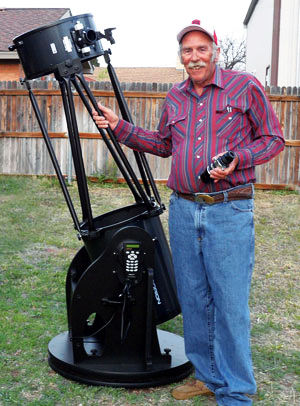Enjoying a Lifelong Passion for Stargazing

Dedicated Orion customer Jeff W. has been enjoying views of the night sky and its many wonders since his days as a Cub Scout. Since then, Jeff has built his own telescope and eyepieces and has used a perpetually growing supply of Orion telescopes and accessories to enhance his observations. Jeff was kind enough to recently share a few words with us, including some sage advice for those just starting out:
How did you become interested in astronomy, and how long have you been actively observing?
I think I've always been interested in Astronomy, at least since I was quite young. Our Cub Scout troop had an outing to an amateur astronomer's home, where we all got to look at the moon through his home made 10" reflector. I recall asking him: "What else do you look at with it?" He told me that there was enough in the night sky to keep him busy for the rest of his life!
My first "real" telescope was an 8" f 6 I built in 1978 with a mirror I purchased in Denver Co. and some junk binocular parts for a diagonal and eyepieces. It was subsequently rebuilt in 1998 with a proper diagonal (purchased from Orion) and eyepieces I handmade from some old camera lenses. Shortly afterwards, I started collecting Orion's Sirius Plossl eyepieces and filters to enhance my observing experience. Recently, I have begun to collect the Edge On Planetary oculars, and purchased the 3X Highlite Barlow.
What is your favorite type of celestial object to view?
Since purchasing the Orion XX14G, I have been observing Planetary Nebulae, and other faint objects, but I enjoy looking at everything! Some nights I just set the 'scope in auto-tracking mode and observe familiar objects.
Share one of your most interesting viewing experiences.
Hands down, the best viewing experience I ever had, was the night I saw Enke's gap in Saturn's rings with my little 8"! A friend of mine, who has been stargazing for many years, told me that was quite an achievement for an 8" instrument.
On a given night, how do you decide what to observe? Do you normally plan ahead or just view whatever you can find?
Some nights are "freelance", but in many cases I will look through Sky and Telescope magazine and make a list of some of the things I wish to look for and observe, then log them when I do observe them and compare my notes with the author's.
Are there any Orion-brand accessories or equipment you use regularly?
With the exception of 3 homemade eyepieces, (two 2" 40mm&45mm, and a 1 1/4" 12.5mm) everything in my eyepiece case is Orion brand. All three of the telescopes I currently own and observe with are Orion Brand: a 120mm f 9 Astroview, a 12" Intelliscope, and the XX14G Go To. I hate to admit it, but the 12" and the 120mm gather a bit of dust nowadays because I love the XX14G!
What advice would you give to aspiring stargazers?
Advice for aspiring stargazers? I was too impatient in the beginning, and wanted to see it all right now! I did not study the constellations, nor their relationships with each other. First, I recommend finding a club near you. The internet is a good place to start. Find out where they go to observe and when the next session is. All the clubs I know about, have websites containing all the information you might need; and don't be afraid to ask questions! If you are on your own, get out your chaise lounge, set it up in the back yard, or better yet a dark sky site, away from city lights. Lean back with a good set of binoculars, and immerse yourself in the mystery of the heavens; take your time and peruse the night sky. Don't just look at the sky; look into it! Learn the constellations, and their places in the night sky; they will perhaps become good friends. You have the rest of your life to get to know the secrets they contain, and they do indeed contain some amazing things to observe!
sales, new products, and astronomy.














